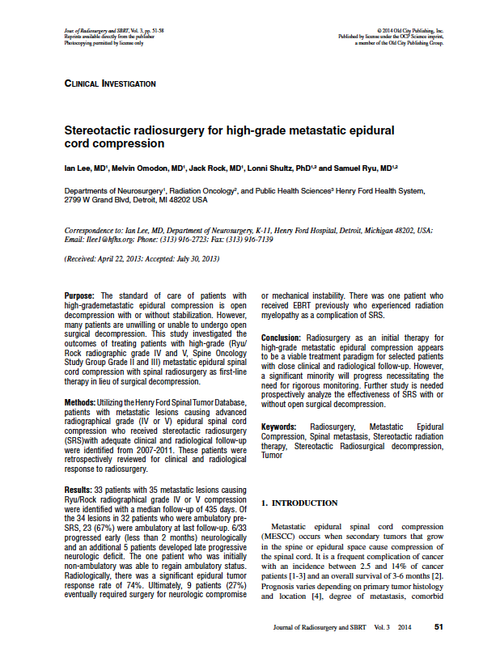- Home
- Journal Contents Downloads
- JRSBRT Downloads
- JRSBRT 3.1, p. 51-58
Product Description
Stereotactic radiosurgery for high-grade metastatic epidural cord compression
Ian Lee, Melvin Omodon, Jack Rock, Ionni Shultz and Samuel Ryu
Purpose: The standard of care of patients with high-grade metastatic epidural compression is open decompression with or without stabilization. However, many patients are unwilling or unable to undergo open surgical decompression. This study investigated the outcomes of treating patients with high-grade (Ryu/Rock radiographic grade IV and V, Spine Oncology Study Group Grade II and III) metastatic epidural spinal cord compression with spinal radiosurgery as first-line therapy in lieu of surgical decompression.
Methods: Utilizing the Henry Ford Spinal Tumor Database, patients with metastatic lesions causing advanced radiographical grade (IV or V) epidural spinal cord compression who received stereotactic radiosurgery (SRS)with adequate clinical and radiological follow-up were identified from 2007-2011. These patients were retrospectively reviewed for clinical and radiological response to radiosurgery.
Results: 33 patients with 35 metastatic lesions causing Ryu/Rock radiographical grade IV or V compression were identified with a median follow-up of 435 days. Of the 34 lesions in 32 patients who were ambulatory pre-SRS, 23 (67%) were ambulatory at last follow-up. 6/33 progressed early (less than 2 months) neurologically and an additional 5 patients developed late progressive neurologic deficit. The one patient who was initially non-ambulatory was able to regain ambulatory status. Radiologically, there was a significant epidural tumor response rate of 74%. Ultimately, 9 patients (27%) eventually required surgery for neurologic compromise or mechanical instability. There was one patient who received EBRT previously who experienced radiation myelopathy as a complication of SRS.
Conclusions: Radiosurgery as an initial therapy for high-grade metastatic epidural compression appears to be a viable treatment paradigm for selected patients with close clinical and radiological follow-up. However, a significant minority will progress necessitating the need for rigorous monitoring. Further study is needed prospectively analyze the effectiveness of SRS with or without open surgical decompression.
Keywords: Radiosurgery, Metastatic Epidural Compression, Spinal metastasis, Stereotactic radiation therapy, Stereotactic Radiosurgical decompression, Tumor
After payment has been processed for your order of a digital copy (PDF) of this article, you will see a download link on your completed order page and also receive an email containing a download link. The links, which will enable you to download one copy of the article, will expire after 24 hours.
 Loading... Please wait...
Loading... Please wait...



